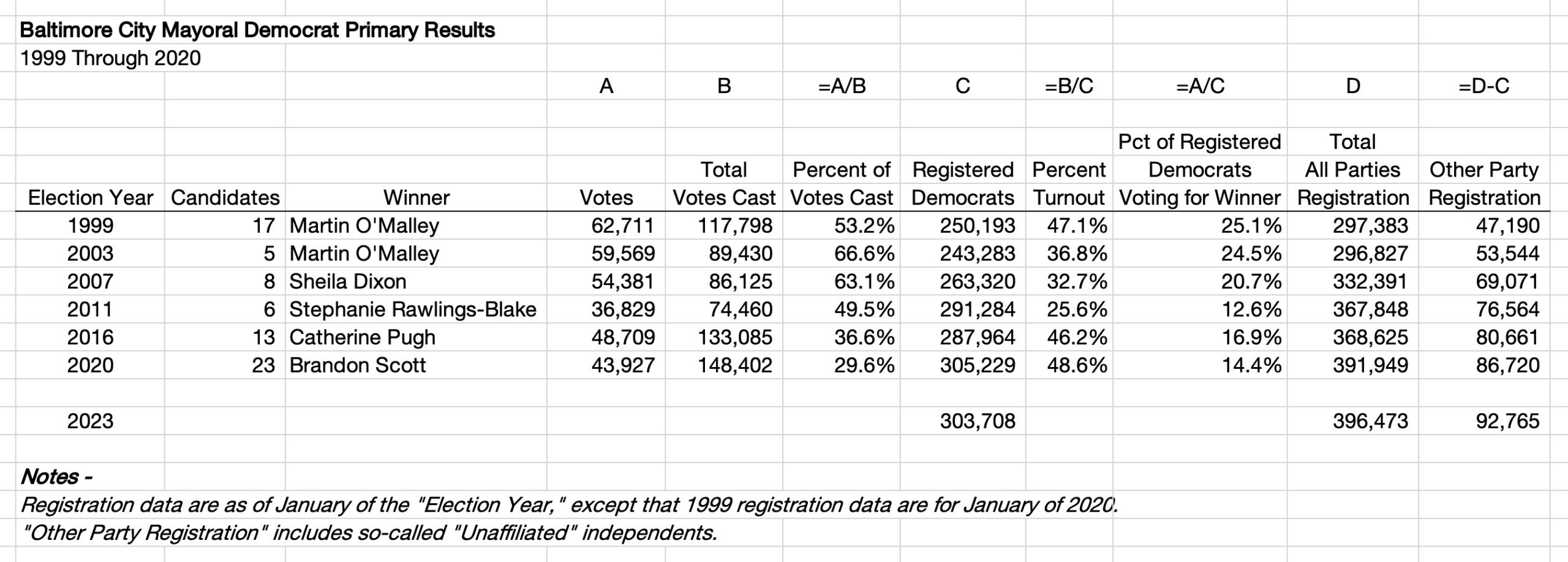Missing the Point – Be the Mayor of Baltimore
So, you’ve been thinking – maybe even bragging to close friends and political confidants – that, if only you were Mayor, you could save the City of Baltimore. Criticizing this and that. Pointing out the shortcomings of the current Mayor and administration. Long on complaints, and short on policies that would actually accomplish the objective.
If that’s you that I’ve just described, don’t bother to read any further. You’re not a serious candidate.
If, on the other hand, you are an experienced and capable Democrat or Independent potential candidate – and not just considering running for business purposes or ego – good news. You’ve come to the right op/ed. I’m going to tell you how to win, and how to become Mayor of Baltimore next year, in 2024. No joke. I can’t guarantee that you’ll be elected, but what I’m about to recommend will give your campaign a very real advantage. This advantage is particularly powerful given that, as things now stand, you’ll be running against one of two highly flawed and vulnerable incumbents – either Mayor Brandon Scott or former Mayor Sheila Dixon – neither one of which will be prepared, financially or intellectually, for a significant general election challenge.
Note the following…
1. In the language of my immigrant grandparents, “Tuchus affen tisch.” Literally translated, it means, “Ass on the table.” Running for Mayor is a big deal. People’s lives and families are on the line, now and for generations to come. If you’re going to do this, you’re either all in, or out. Running for Mayor of Baltimore is not a part-time job.
2. You can be a man or a woman, Black or White, Democrat or “Unaffiliated” Independent. What you can’t be is a Republican. Baltimore is a Democrat town. Even a populist Republican as intelligent and productive as Larry Hogan would have difficulty winning. But then, he’s not running for Mayor and the stench of Trump-era Republicanism is too potent for even the most normal Republican candidate to overcome.
3. You don’t have to be wealthy and you can raise money, but you can’t be beholden to developers, law firms, or other corporate sources of major individual and bundled contributions. Contributions over $1000, even though well below the legal limit of $6000 per four-year election cycle, aren’t going to be something you can accept. But then you won’t need them either. In fact, accepting big, strings-attached money will be counter-productive for the campaign strategy I’m advocating.
4. If you think in terms of smallish, do-good programs and policies, you’re wasting your time at the expense of the hopes, dreams, and potential of the people who you are running to help.
5. The people of Baltimore – including, in particular, the two-thirds of the families who struggle every day to get by – may be in trouble, may be under-educated, but they’re not stupid or fools. They’ve been patronized by small-minded politicians with special interest backing for decades, and to what end? Little programs don’t work. What the city needs is huge, multi-billion dollar initiatives, funded by state, federal, and independent commercial markets that, collectively, have the power to accomplish a massive, fully coordinated, all-inclusive renovation of the Baltimore economy.
What’s “the trick” I’m recommending? The cornerstone of a winning campaign for Mayor? Take a look at the table below. It describes the six Democrat mayoral primaries that have occurred over the past almost 25 years, since the turn of the century.
All election data cited in this op/ed is available online from the Maryland Board of Elections.

O’Malley won the first two and then went on to become Governor. Dixon, now running yet again against current Mayor Scott, wins the third with an impressive 63.1% of the vote – but is then forced to leave office early. Rawlings-Blake replaces Dixon, winning her own race with just less than a majority of the votes. Pugh wins her race with only 36.65 of the vote – and then she leaves early to go to jail.
And then Mayor Scott wins his first race – against a whopping 23 opponents – with only 29.6% of the votes cast which, in 2020, was only 14.4% of the total number of registered Democrats. Put another way, more than 85% of Baltimore’s registered Democrats either wanted someone else to be their Mayor or didn’t care enough about any of the candidates to vote. With only 43,927 votes in the Democrat primary, in a city with 305,229 registered Democrats and 391,949 total registered voters, Brandon Scott became Mayor of Baltimore.
All these elections and the city continues its decline.
So, here’s what you do to unseat the incumbent Mayor and win your chance to save the City of Baltimore. What you do is skip the primary. Register as an “Unaffiliated,” independent voter. And then run for Mayor of Baltimore as a “petition candidate.”
According to the Maryland Board of Elections, to qualify as a Petition Candidate, you need the signatures of 1.0% of the eligible voters in the jurisdiction where you are running. In 2020, there were 391,929 registered voters in the city, all parties and unaffiliated voters included. One percent of that total is only 3,920 signatures. It is a low bar easy to accomplish through an aggressive face-to-face, door-to-door campaign effort which should garner ten times as many, if not more. More signatures than the votes Brandon Scott received in the primary that year.
Start campaigning now, door-to-door and otherwise, but leave it to the people registering for the Democrat primary to spend themselves broke beating each other up. Leverage free media and public interest in the primary to get your message of independence and programs out there – without the risk of your losing, even coming in second, in a crowded field of opponents.
Why not do both? Why not run in the Democratic primary and then again as an independent? Because you’d be running against too many opponents and can’t make your pitch without spending a fortune and maybe not even then. Bank your money for the general election. Let the Democrat candidates point out the shortcomings of the eventual winner for you and for general election voters. And because running in both the primary as a Democrat and then in the general as an Independent is a sore loser play that most voters won’t like. If you run in both, no one will buy that you are, in fact, an Independent. You’ll come across as an opportunist who is willing to be whoever it takes to get elected.
Make your campaign about the lack of progress your opponent has made. Ask the question, trite as it may be, “How are you better off today than you were when Mayor Scott or former Mayor Dixon was first elected?” Talk about the relationships between the Mayor and special interests. Take pride in your independence. Don’t take contributions greater than $1000 and recommend campaign finance reform to reduce the influence of money on politics.
For that matter, challenge voters to ask what party loyalties, are and what voting Democrat or Republican has ever done for them personally or their city.
Go after the incumbent, debating and confronting Mayor Scott or whoever is running at every opportunity that presents itself, making independence and effective government your principal campaign theme. Remind the voters that you’re independent of party management, developers, law firms, and other large-dollar contributors. “My only commitment and loyalty are to the people – to all the people – of Baltimore. The only decisions I make will be about what you want and what’s in your best interests.”
And come armed with the general framework of very large-scale, but nonetheless smart and realistic programs that inspire and energize the electorate. Be prepared to offer the people and voters of Baltimore a clear and powerful alternative to the drivel of your opponent’s campaign.

Les Cohen is a long-term Marylander, having grown up in Annapolis. Professionally, he writes and edits materials for business and political clients from his base of operations in Columbia, Maryland. He has a Ph.D. in Urban and Regional Economics. Leave a comment or feel free to send him an email to Les@Writeaway.us.

